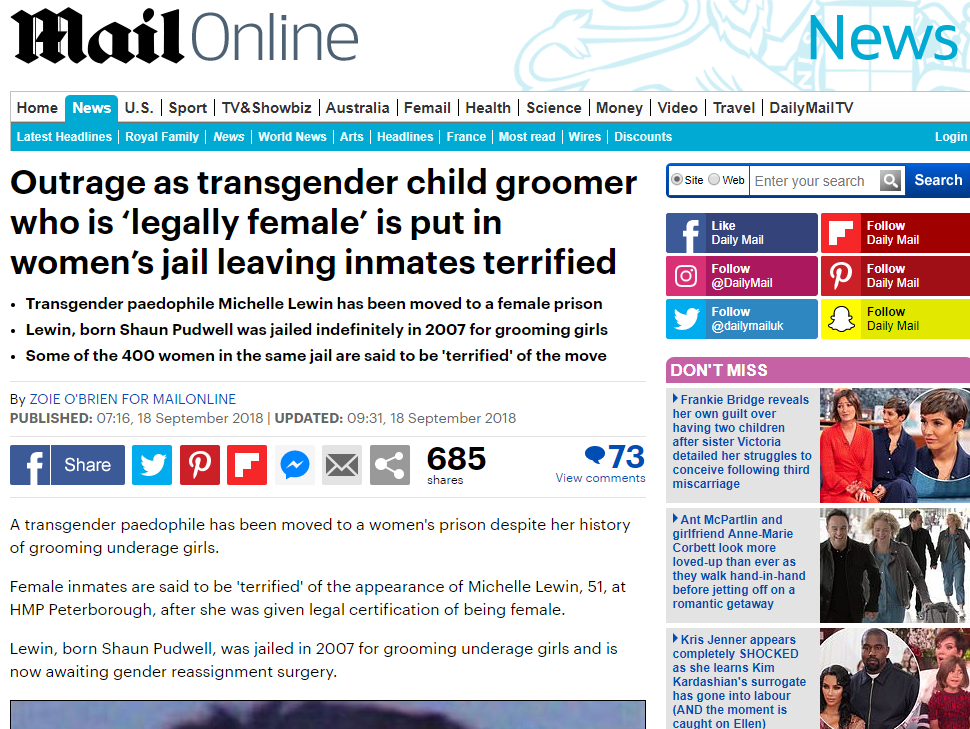
A convicted sex offender who changed gender has had her complaint about two newspaper articles dismissed.
Michelle Lewin complained to the Independent Press Standards Organisation over articles published in the Sun, headlined: “Fury as trans paedo put in women’s jail”, and on Mail Online with the header: “Outrage as transgender child groomer who is ‘legally female’ is put in women’s jail leaving inmates terrified”.
In the articles, published on 18 September last year, it was reported female inmates were “terrified” after she was moved into the female prison.
The articles reported Lewin’s name, her age and that she had been jailed for “grooming underage girls”, alongside a picture of her in her pre-transition male identity, and stated she obtained a Gender Recognition Certificate and was awaiting realignment surgery.
The article reported there had been no issues with her conduct in her new prison.
Lewin said the articles breached Clause 2 (privacy) of the Editors’ Code of Practice, as it revealed her former male name and the fact she had a GRC.
She said her current and former names had never been placed in the public domain and said revealing the link was illegal under the terms of the Gender Recognition Act.
In her complaint against the Sun she also cited Clause 3 (harassment) of the Editors’ Code due to two approaches made by a journalist to her husband at her home.
She claimed the reporter spoke to her husband at length and was asked to leave only to return later that day when they spoke to her mother who asked him to leave, adding that the journalist was physically removed by her husband.
The Sun and Mail Online both disputed a breach of Clause 2 (privacy) and said a person’s name could not reasonably be considered private information and a change of name, for whatever reason, did not make referring to a previous name intrusive.
The Sun argued there was a clear public interest in publishing Lewin’s former name and informing readers of her new identity given she had been jailed as a result of committing serious sexual offences.
The publication also said it had previously been reported in 2011 that the complainant had changed her first name from a male to a female one, and that the complainant had used her female name with a different surname as part of her appeal process, including on public documents.
The Sun provided a reporter’s recording of the two visits to the complainant’s husband’s home which it said showed he was not asked to leave on either occasion and on the first the husband spent time answering questions and had asked for a business card telling him he might speak to him further after speaking to a solicitor.
In the recording of the second visit the complainant’s husband could be heard threatening him and becoming physically aggressive.
IPSO said the link between an individual’s former name and current name, in circumstances where it also revealed a change of legal gender, could represent private information about them but that Lewin’s details had previously been placed in the public domain.
However, the Sun, and later Mail Online, had made the connection between Lewin’s previous and new identity for the first time but said there was a clear justification for doing so due to her criminal past.
IPSO added information about the GRC was also in the public interest due to the concerns of Lewin’s move to a women’s prison meaning her full circumstances were relevant to the debate.
The committee said the recording of the Sun journalist’s visit to Lewin’s husband’s home showed he had not continued to question him after being told to stop and had left when told to do so, even receiving a number of threats on the second visit.
Neither complaint was upheld.
Read the full IPSO rulings here and here.
Email pged@pressgazette.co.uk to point out mistakes, provide story tips or send in a letter for publication on our "Letters Page" blog
